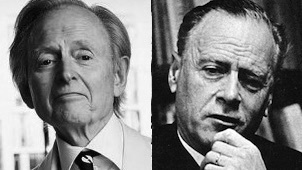The November issue of Vanity Fair carries an in-depth and mostly laudatory portrait of that legendary giant of an American writer, Tom Wolfe.
It's an 11,500-word piece by Michael Lewis, author of Moneyball, Flash Boys and other impressively crafted investigative works. The article, How Tom Wolfe Became ... Tom Wolfe, will have strong resonance for anyone familiar with the vast Wolfe oeuvre, particularly the incisive, compelling journalism over decades as well as the more recent hefty novels of acute social observation.
 For me, I found myself reflecting on a particular achievement of Wolfe's that shouldn't ever be overlooked. Wolfe was responsible for, among countless un-put-downable articles, the single most stirring clarion call that brought Marshall McLuhan to broad public attention.
For me, I found myself reflecting on a particular achievement of Wolfe's that shouldn't ever be overlooked. Wolfe was responsible for, among countless un-put-downable articles, the single most stirring clarion call that brought Marshall McLuhan to broad public attention.
It came in 1965, carried in the Sunday magazine section of the old New York Herald Tribune, which later survived as New York magazine. It's fair to say that with it Wolfe started the process that turned a hitherto largely unknown Canadian academic (what Wolfe himself called more precisely "a word-of-mouth celebrity") into a worldwide byword for the media revolution that has overtaken our culture over the past half-century.
That article's headline was prophetic as well as provocative: What if he ... is Right? -- and it delved eagerly, thoroughly and enlighteningly into McLuhan's original and sometimes gnomic analyses of communications and society.
Fifty years later, Wolfe now features in an invaluable online video resource on McLuhan that has, also this month, become widely available to scholars and public alike. It's The 'Marshall McLuhan Speaks' Special Collection, created by producers Stephanie McLuhan and Sandy Pearl, in collaboration with the Open Education Consortium -- a global network of academic bodies that in this country includes Harvard University, MIT and the Smithsonian Institution.
Rightly enough, Wolfe sits at the head of this uniquely comprehensive archive, in an illuminating video introduction that he wrote and narrated, on- and off-camera.
Watch Wolfe on McLuhan here (with the added presence of Woody Allen):
Producers McLuhan (herself a veteran TV journalist and also daughter of Marshall) and Pearl (an award-winning news and arts producer/writer) have pulled together scores of interviews, lectures, panel discussions and other forms of utterance -- all recorded in the analog age, in the three decades before Marshall McLuhan died in 1980.
The Special Collection's importance undeniably lies in the fact, which its title emphasizes, that here the 20th century sage is, gratifyingly, speaking for himself.
But I for one am grateful we have Wolfe's words as well, assessing -- as clearly as he does -- what McLuhan was pointing out:
Nothing people can use electronic media for -- no message that anyone, no matter how powerful or persuasive, can deliver -- even begins to compare with what new media have done to mankind, neurologically and temperamentally.
That is how Wolfe so carefully elucidates McLuhan's fundamental dictum, "The Medium is the Message" -- which is now more than ever being demonstrated every minute all across the word-wide web and in every smartphone.
****
Read more of David Tereshchuk's media industry insights at his weekly column, "The Media Beat", with accompanying video and audio. Listen also to "The Media Beat" podcasts on demand from Connecticut's NPR station WHDD and at iTunes.